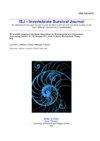Redefining operant conditioning of escape behaviour in Lymnaea stagnalis
IF 1.2
4区 农林科学
Q4 IMMUNOLOGY
引用次数: 9
Abstract
The escape behaviour is one of the many behavioural responses that can be operantly conditioned in a stimulus-dependent manner in both vertebrates and invertebrates. By exposing the pond snail Lymnaea stagnalis repeatedly to a negative reinforcement its natural tendency to explore its surroundings can be operantly conditioned in both adult and aged snails. When adult snails were trained with 100 mM of KCl their number of escapes was significantly decreased and the latency to first escape was significantly increased. Our behavioural protocol allowed us to investigate memory acquisition, consolidation, and retrieval in pre- and post-training sessions over different days. From the 3rd day of training the learned response was strengthened: the number of the escapes in the post-test session remained significantly reduced even when animals were presented with distilled water. Moreover, adult snails exposed to the negative reinforcement for at least 4 days started to escape significantly less than the control group also in the pre-test session. This effect became more pronounced in the following days and was accompanied by a significant increase in the latency to first escape at the beginning of the pre-test on day 6 and 7. Aged snails, instead, showed selective deficiencies when operantly conditioned: memory retention appeared only after 7 days, while memory retrieval could not be induced. This redefined paradigm can help unravelling a variety of sophisticated cognitive phenomena in L. stagnalis and could be employed also to study the basis of memory impairment occurring during neuro-aging.重新定义海蛾逃避行为的操作性条件反射
在脊椎动物和无脊椎动物中,逃避行为是许多行为反应中的一种,可以以刺激依赖的方式进行操作性条件反射。通过将池塘蜗牛lynaea alis反复暴露于负强化环境中,其探索周围环境的自然倾向可以在成年和老年蜗牛中进行操作条件调节。用100 mM氯化钾培养成螺后,成螺的逃生次数显著减少,首次逃生潜伏期显著增加。我们的行为协议允许我们在不同的训练前和训练后调查记忆的获取、巩固和检索。从训练的第三天开始,习得反应得到加强:即使给动物提供蒸馏水,后测试阶段的逃跑次数仍然显著减少。此外,负强化处理4 d以上的成体蜗牛在试前阶段的逃跑率也明显低于对照组。这种效果在接下来的几天里变得更加明显,并且在第6天和第7天的预试开始时,首次逃逸的潜伏期显着增加。相反,老年蜗牛在操作条件下表现出选择性缺陷:记忆保留仅在7天后出现,而记忆检索不能被诱导。这一重新定义的范式可以帮助揭示停滞l.s的各种复杂认知现象,也可以用于研究神经衰老过程中发生的记忆障碍的基础。
本文章由计算机程序翻译,如有差异,请以英文原文为准。
求助全文
约1分钟内获得全文
求助全文
来源期刊

ISJ-Invertebrate Survival Journal
IMMUNOLOGY-ZOOLOGY
CiteScore
2.10
自引率
0.00%
发文量
0
审稿时长
>12 weeks
期刊介绍:
Invertebrate Survival Journal (ISJ) is an international and open access journal devoted to prompt and innovative studies on the basic defense mechanisms in invertebrates, in particular with a view to identifying biotechnologies able to act against derived diseases and related economic damage.
Contributions will be mainly in the form of Letters to the Editor, Visions and Perspectives, Short Communications, Technical Reports, Research Reports, Review, Minireview and Reports of Meetings. Letters to the Editor can be commentaries or perspectives on invertebrate defence mechanisms or replies to the data published in ISJ.
 求助内容:
求助内容: 应助结果提醒方式:
应助结果提醒方式:


